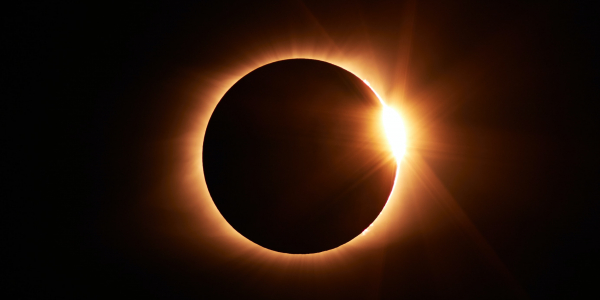In the Moon’s Shadow – Chasing Eclipses: St. Louis Astronomical Society February Meeting
On Monday, April 8, 2024, a total eclipse of the sun will be visible along a path 100 to 124 miles wide, stretching from the mid-Pacific Ocean to Newfoundland and into the northern Atlantic Ocean. The entire continental United States will see at least a partial solar eclipse. Locally the total eclipse path runs through southeast Missouri, near Poplar Bluff, Perryville, and Cape Girardeau, and across Illinois through Carbondale, Mt. Vernon, and Fairfield. The sun will be about 97% eclipsed as viewed from the Saint Louis area. Dr. Speck will explain where, when, and why a solar eclipse occurs. She will also talk about safe ways to observe the partial phase of a solar eclipse. Except during the total phase, it is dangerous to observe the sun directly without special equipment made for this purpose. SLAS will provide 5 pairs of eclipse glasses to each adult who attends this meeting in person.
Dr. Angela Speck has a doctorate in Astronomy from University College London and has been a Professor and Department Chair in the Department of Physics & Astronomy since her arrival at University of Texas at San Antonio in Fall 2019. Prior to joining UTSA, she was at the University of Missouri (MU) for 17 years where she built the MU astronomy program. Her research interests include stardust, infrared astronomy, and stellar evolution, as well as science education and public outreach. In addition, Dr. Speck was a member of the American Astronomical Society (AAS) Council from 2011-14, a member of the congressionally appointed FACA committee: Astronomy and Astrophysics Advisory Committee (AAAC, 2013-2016), and has co-chaired the AAS Solar Eclipse taskforce since its inception in 2014. She became a Fellow of the American Association for the Advancement of Science (AAAS) in 2022. Dr. Speck’s academic career exemplifies the idea that there should be a strong synergy between the research, teaching and service components for any faculty member.
The St. Louis Astronomical Society is an organization for individuals interested in astronomy and telescopes. The public is invited to attend its meetings, telescope observing sessions, and special events. For more information about Astronomical Society events, please visit www.slasonline.org.
Free parking will be available.

